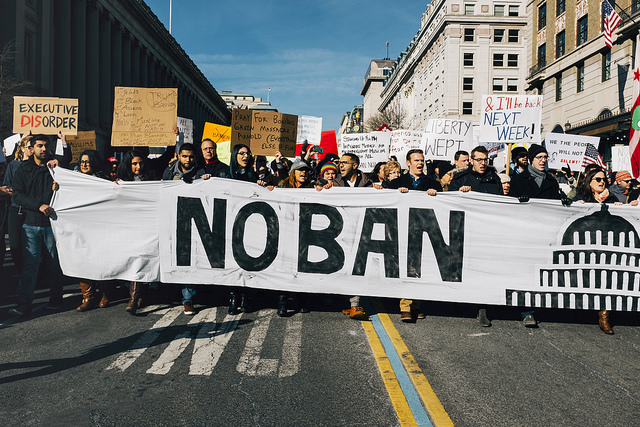
Donald Trump claims that his highly contested travel ban barring people from seven Muslim nations from entering the U.S. was necessary for national security purposes. But will the ban actually prevent terrorist attacks? An article in the Los Angeles Times points out that attacks within U.S. borders have primarily been carried out by individuals from nations that are not on the ban list. The men responsible for the Boston Marathon bombing were of Chechen decent for example, and most of the 9/11 hijackers were from Saudi Arabia, a notable exception from Trump’s executive order. The ban also fails to address extremism within the United States — Omar Mateen and Syed Rizwan Farook, who were perpetrators of the Orlando nightclub shooting and San Bernardino attack, respectively, were American citizens.
In the article, sociologist Charles Kurzman explains that his research has not identified a single death since the 9/11 attacks caused by extremists from the seven nations that Trump placed on the banned list. Furthermore, only a small number of deaths have been correlated with individuals whose family ancestry are from those seven nations. Kurzman states,
“In general, Islamic extremists have accounted for a minuscule amount of the roughly 240,000 murders since Sept. 11, 2001 … I can only conclude that this is whipping up fear and hostility toward Americans who have family background from these countries.”

Comments 17
Genius — March 7, 2017
I have never been hit by a car, for that reason road safety is not an issue for me
lisa — August 20, 2020
Hi, Great post. It is very informative post for everyone I love reading this information. This is a perfect blog about best campervan. Keep posting and keep sharing like this.albania beaches
lisa — August 28, 2020
Great post about your road trip in Europe. Can’t wait to get a vacation leave and be in these places. Love the photos, by the way.manchester street
lisa — September 23, 2020
Hello, This seems like such a stunning trip! I too would love to explore an organic farm, take cooking classes, walk on beautiful sunny hikes, enjoy delicious food and bask in the sun. I cannot wait for summer vacation to start already.visit albania
lisa — October 20, 2020
Just to let you know this is appearing in my link round up on Saturday 1/12 at CrazyLovelyMe.com! I've had wanderlust for ages but no money to travel with – it definitely inspired me!albania tirana
lisa — January 9, 2022
Someone travels to gain knowledge and experience, someone travels for pleasure, someone travels for business purposes etc. It has much educative value. To travel from one place to another for different purposes is generally called travelling. People do not travel always for the same purposes. Luchthavenvervoer Kortrijk
lisa — January 17, 2022
Traveling does not always have to cost you an arm and a leg … There are ways to save money to stretch your travel budget. Booking things in advance is not always a smart idea … for me, last minute bookings work.Fafe
lisa — January 19, 2022
Thanks for this lists of essentials whenever there will be a family road trip. This will be a really big help for every moms out there when it comes to packing especially for their kids necessary needs like emergency medicines and foods whenever they get hungry. Thanks again for sharing this post!Palm Springs Bachelor parties
lisa — January 21, 2022
Travel is an important part of our life and I think this is the best way to create positivity in life. Travel to new places in the world is also a way to learn about new things in the world. I think it is best for health.Surfing at bali
emma — January 29, 2022
A wise man whose name escapes me once said (and I paraphrase): The only way to authentically experience a place is through being there on a business trip. Anything else, and you're part of the problem. I tend to agree.Chania car rentals
lisa — February 1, 2022
After reading this point I am blessed to have this blog. I appreciate your work and knowledge. I will recommend this content to others, further people will get the advantage.camper dealers in Missouri
lisa — February 1, 2022
Travel can be done by foot, bicycle, automobile, train, boat, bus, airplane, ship or other means, with or without luggage, and can be one way or round trip.camper dealers in Missouri
lisa — February 1, 2022
According to travel your post too good. Traveling and Runing too good for everyone. so don’t waste your time. just fare makers providing your cheap airline tickets, Visa and tour packages in reasonable fares.Flacco vakantie aanbiedingen
lisa — February 3, 2022
It is good to have most of these articles around to maintain the regular flow of information. Help people that no one cruise rentals could do it later, good work! This is so helpful! Help people that no one could do it later, good work.Taxi In Chertsey
lisa — April 5, 2022
To journey from one place to every other for distinctive functions is commonly called traveling. People do no longer travel usually for the identical functions. Someone travels to gain knowledge and revel in, someone travels for pride, someone travels for enterprise purposes and many others.restaurant utrecht centrum
lisa — April 5, 2022
There are ways to save money to stretch your travel budget. Booking things in advance is not always a smart idea … for me, last minute bookings work.Neelum Valley 3 Days Tour
Zampa — May 22, 2023
Travelling is one hobby that every person must adopt at one time or the alternative, as part of their earthly existence; it does not matter what the purpose of travel is, or whether or not the journey is nearby or worldwide.family vacations in Europe